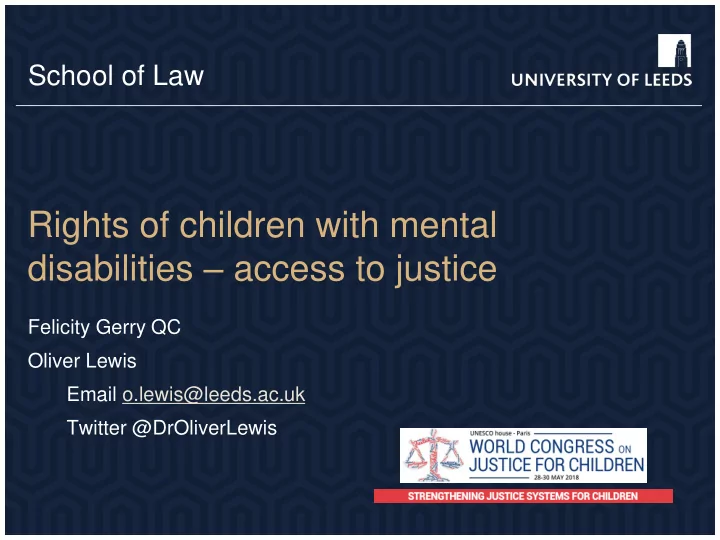

School of Law Rights of children with mental disabilities – access to justice Felicity Gerry QC Oliver Lewis Email o.lewis@leeds.ac.uk Twitter @DrOliverLewis
Context Under-diagnosis Lack of data Rights are removed due to mental disability Domains • Criminal Justice • Civil justice • Administrative justice
Communication skills
We need to adjust Reasonable accommodations / adjustments UN Convention on the Rights of Persons with Disabilities (CRPD) Article 5: failure to provide reasonable accommodations = discrimination CRPD Article 13: access to justice for all It doesn’t matter what role the child plays
Considerations 1. Ask the court for adjustments 2. Visit the courtroom 3. Schedule sensibly 4. Bring expertise in advance 5. Check on the child
Planning 1. Diversity 2. Recognise and adjust 3. Child-friendly environment 4. Ground rules 5. Adjust your expectations
Interviewing 1. Use literal and simple language 2. Avoid complex questions particularly about time 3. Use play, art and images without leading 4. Adapt language, use writing, diagrams, drawings 5. Visual timetable 6. Post-it notes 7. Ask child to explain back to you 8. Take your time
The challenges of detention Through the lens of trauma “Challenging behavior often originates in immense feelings of vulnerability” – Alexandra Cook Trauma can affect children in 7 ways 1. Attachment 2. Biology 3. Affect regulation 4. Dissociation 5. Behavioural control 6. Cognition 7. Self-concept
Finally Develop your mental disability literacy Share tips with other lawyers Get involved in judicial training Involve NGOs of and for people with intellectual disabilities and their families Keep in touch! o.lewis@leeds.ac.uk
Resources • The Advocates Gateway – various toolkits • Blue Knott Foundation, “Trauma and the law – applying trauma- informed practice to legal and judicial contexts” (2016) • Alexandra Cook et al., “Complex Trauma in Children and Adolescence”, The National Child Traumatic Stress Network, 2003 • MDAC, “Access to Justice for Children with Mental Disabilities” (2015) • MDAC, “Charm toolkit” (2017) – including communications toolkit • Substance Abuse and Mental Health Services Administration (SAMHSA), “Essential Components of Trauma -Informed Judicial Practice”, 2013, • YoungMinds, “Conditions”, youngminds.org.uk
Recommend
More recommend